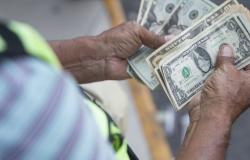The next few days could be marked by a new appeasement of tensions on customs duties if new trade agreements are concluded with the United States and its main partners – in particular, China – or by pessimism if macroeconomic data prove to be disappointing.
On the geopolitical front, American president Donald Trump must also start a strategic tour in the Middle East.
Overview of market prospects in the coming days:
1 / USA-China crucial meeting
The Chinese Deputy Prime Minister He Lifeng will meet this weekend in Switzerland with the American secretary to the Treasury, Scott Bessent, and with the American representative for trade, Jamieson Greer, a meeting that could mark the starting point for commercial negotiations between the two countries.
In Switzerland, the American and Chinese delegations should discuss a drop in the most important customs duties that the two countries have imposed themselves, two sources said in fact of the preparations for the meeting.
Washington imposed customs duties of 145% on products from China. In response, Beijing has decided to raise its customs duties on imported American products to 125%.
Discussions should also relate to customs duties applicable to specific products, export control and Donald Trump’s decision to end exemptions for low -value imports, added one of the sources.
The hopes of de -escalation in the trade conflict between the two major economic powers have already benefited risky assets – actions as oil.
The S&P 500 has returned to more than 17% from a hollow of April 7 and the British barrel now evolves beyond 64 dollars per barrel after falling below 59 dollars.
“If the two countries set a date to start formal commercial negotiations and agree to reduce their current high customs duties while negotiations are continuing, the markets will have a break and the crude barrel could win 2 to 3 additional dollars,” said Vandana Hari, founder of the supplier of petroleum market Vanda Insights.
2/ an agreement that is not a model
Great Britain and the United States announced the first trade agreement on Thursday since the start of the price torment triggered by the administration of Donald Trump.
The American president and British Prime Minister Keir Starmer described as “revolutionary” the agreement under which customs duties on British deliveries of cars, engines and plane rooms, as well as on aluminum and steel, will be reduced or deleted in exchange for better access to the British market for beef and American machines, among other provisions.
Washington, however, maintained customs duties of 10% on everything else and the tenant of the White House warned that this agreement was in no way a model for negotiations with other countries.
The impact of customs duties on the economy created such uncertainty that the decision -makers of the Bank of England (BOE) were divided Thursday on the monetary policy to follow.
The data to come on employment and growth in the United Kingdom should be more than ever in the viewfinder of investors.
3 / The effect of surcharges
The week will also be rich in macroeconomic indicators from the United States while investors and political leaders are still trying to understand the impact of customs duties imposed by Donald Trump on growth and prices.
The consumer price index of April, scheduled for Tuesday, will provide a new reading of inflation trends, while the retail sales figures in April, which will be published Thursday, will give the latest information on the health of consumer spending.
In the wake of Washington customs decisions, retail sales have experienced their highest progression for more than two years in March, households having increased their purchases of cars and other goods to avoid price increases due to surcharge.
Investors are waiting in particular to see if the weakness perceived in the trusted surveys and other data results in a slowdown in economic activity.
The American Federal Reserve (Fed) maintained its interest rates last Wednesday, while declaring that the risks of inflation and unemployment had increased.
The quarterly results of American companies also continue, including those of the Walmart giant, which will constitute another good opportunity to measure the propensity of consumers to spend.
4 / Trump in the Middle East
Donald Trump will start his first diplomatic tour of his second term in three Middle East countries next week, starting with Saudi Arabia, a visit that will be accompanied by investment conferences, in addition to commercial and security issues.
Donald Trump said that he would soon announce if the United States would soften the export restrictions of electronic fleas to certain Gulf countries, while Saudi Arabia said that agreements on mines and minerals would be discussed.
Energy should also occupy an important place, while according to some sources, Washington will no longer require Saudi Arabia that it normalizes its links with Israel as a prerequisite for the advancement of negotiations on civilian nuclear cooperation, which would represent a major concession from the United States.
Donald Trump’s trip should not include stopover in Israel, which is nevertheless a close ally of Washington.
5 / The return of Asian currencies
After years of sidelining by the powerful dollar, Asian currencies are back: the unprecedented increase in the Taiwanese dollar (8% in two days) suggests that liquidity flows move en masse to Asia, which has already drawn the attention of central banks.
The Hong Kong monetary authority intervened to maintain the anchoring of its currency in the dollar. Investors also believe that the meteoric increase in Taiwanese currency could be a sign of an agreement aimed at weakening the greenback in exchange for commercial concessions, which the president of the island denies.
The idea that countries can let their currency strengthen in the context of commercial negotiations with the United States will remain in mind, while the long-awaited negotiations open between the United States and China.
More specifically, the South Korean delegation in Washington said that its Ministry of Finance and the United States Treasury would hold separate discussions on monetary policy at the request of the Treasury Secretary Scott Bessent.
(Graphics by Sumanta Sen and Rae Wee, compiled by Dhara Ranasinghe, French version Diana Mandia, edited by Blandine Hénault)






